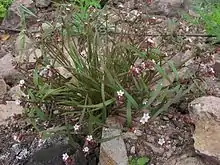Claytonia exigua
Claytonia exigua is a species of wildflower known by the common names serpentine springbeauty and pale claytonia, in the family Montiaceae.
| Claytonia exigua | |
|---|---|
 | |
| Scientific classification | |
| Kingdom: | Plantae |
| Clade: | Tracheophytes |
| Clade: | Angiosperms |
| Clade: | Eudicots |
| Order: | Caryophyllales |
| Family: | Montiaceae |
| Genus: | Claytonia |
| Species: | C. exigua |
| Binomial name | |
| Claytonia exigua | |
It is native to western North America from British Columbia to Idaho to California, where it grows in a number of habitat types, including plant communities on serpentine soils.[1]
Description
Claytonia exigua is a fleshy annual herb producing a patch of erect or leaning stems up to about 15 centimeters tall.
The thick leaves are linear in shape and fingerlike near the base of the plant and crescent to disc-shaped farther up the stem. The plant is hairless and waxy and varies in color from green to pinkish, grayish, or brownish.
The inflorescence holds several flowers on drooping pedicels which turn erect as the plant develops fruit. The flower has five lobed petals each a few millimeters long and in shades of pink, white, or pink-streaked white.
The fruit is a capsule less than three millimeters long containing a few tiny seeds.
References
- Miller, J. M. and K. L. Chambers. 2006. Systematics of Claytonia (Portulacaceae). Systematic Botany Monographs 78: 1-234. ISBN 0-912861-78-9
External links
 Media related to Claytonia exigua at Wikimedia Commons
Media related to Claytonia exigua at Wikimedia Commons- Flora North America
- Calflora Database: Claytonia exigua (Little spring beauty, Serpentine springbeauty)
- Jepson Manual Treatment of Claytonia exigua
- UC CalPhotos gallery of Claytonia exigua